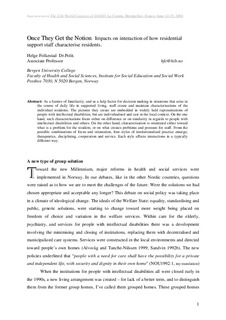| dc.contributor.author | Folkestad, Helge | |
| dc.date.accessioned | 2018-02-01T15:08:18Z | |
| dc.date.available | 2018-02-01T15:08:18Z | |
| dc.date.issued | 2004 | |
| dc.identifier.uri | http://hdl.handle.net/11250/2481751 | |
| dc.description.abstract | As a feature of familiarity, and as a help factor for decision making in situations that arise in the course of daily life in supported living, staff create and maintain characterisations of the individual residents. The picture they create are embedded in widely held representations of people with intellectual disabilities, but are individualised and cast in the local context. On the one hand, such characterisations focus either on difference or on similarity in regards to people with intellectual disabilities and others. On the other hand, characterisation is orientated either toward what is a problem for the resident, or on what creates problems and pressure for staff. From the possible combinations of focus and orientation, four styles of institutionalised practice emerge; therapeutics, disciplining, cooperation and service. Each style affects interactions in a typically different way. | en |
| dc.language.iso | eng | en |
| dc.publisher | The 12th World Congress of Iassid. Le Corum, Montpellier, France. June 14-19, 2004 | en |
| dc.subject.other | intellectual disability | en |
| dc.subject.other | residential homes | en |
| dc.subject.other | residential staff | en |
| dc.subject.other | characterisation | en |
| dc.subject.other | interaction | en |
| dc.title | Once they get the notion : impacts on interaction of how residential support staff characterise residents | en |
| dc.type | Lecture | en |
| dc.subject.nsi | VDP::Samfunnsvitenskap: 200::Sosialt arbeid: 360 | en |
| dc.subject.nsi | VDP::Medisinske Fag: 700::Helsefag: 800::Andre helsefag: 829 | en |
| dc.identifier.cristin | 622249 | |
